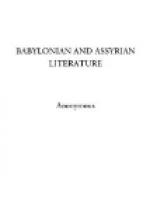The King leaned on his bow, and eyed the maid,
A happy look came in his eyes,—and fled,
For lo! the curtain quick aside is pushed,
And Sabitu within upon them rushed.
She stately glides across the shining floor,
And eyes them both, then turns toward the door.
But Izdubar is equal to the task,
With grace now smiling, of the maid doth ask:
“O Sabitu! wouldst thou tell me the way
To Khasisadra? for I go this day.
If I the sea may cross, how shall I go?
Or through the desert? thou the path mayst know.”
The maiden startled looks upon his face,
And thus she answers him with queenly grace:
“So soon must go? Thou canst not cross
the sea,
For thou wilt perish in the waves that way.
Great Samas once the way of me did ask,
And I forbade him, but the mighty task
He undertook, and crossed the mighty deep,
Where Death’s dark waters lie in wait asleep:
His mighty car of gold swept through the skies,
With fiery chargers now he daily flies.
When I approach thee, thou from me wouldst flee?
But if thou must so soon thus go, the sea
Perhaps thou too canst cross, if thou wilt ’void
Death’s waters, which relentless ever glide.
But Izdubar, Ur-Hea, here hath come!
The boatman of the seer, who to his home
Returns. He with an axe in yonder woods
A vessel builds to cross the raging floods.
If thou desirest not to cross with him,
We here will welcome thee through endless time;
But if thou goest, may they see thy face
Thou seekest,—welcome thee, and thy heart
bless.”
[Footnote 1: “Siduri,” the “pourer” or “shedder forth,” the “all-bountiful,” the goddess who brings the rain, and mists, and running streams to fill the vegetable world with its productions; the goddess who presides over productive nature. She was also called “the Goddess of Wisdom.”]
[Footnote 2: Seven spirits of the earth and heaven, the daughters of Hea.]
[Footnote 3: “Nusku,” a budding or blooming shrub or branch, the wand of the Queen, used in magical incantations, which was called the plant of Nusku, the divining-rod.]
[Footnote 4: See Accadian songs, “C.I.W.A.,” vol. ii. 15, 16, and translated by Mr. Sayce in “Records of the Past, vol. xi. pp. 154, 155.]
[Footnote 5: “Kara!” cry out, sing, shout.]
[Footnote 6: “Sa-lum-mat-u na-si,” lift up the shadows, or be joyful.]
[Footnote 7: “Our corn is bearded.” This refers to the heads of wheat which are bearded. See translation by Mr. Sayce, “the corn is bearded.” ("Records of the Past,” vol. xi. p. 156.)]
COLUMN II
THE KING ON LEAVING THE HAPPY HALLS MEETS UR-HEA, THE BOATMAN OF THE SEER KHASISADRA—THEY BUILD A SHIP AND EMBARK ON AN UNKNOWN SEA, AND ON THEIR VOYAGE PASS THROUGH THE WATERS OF DEATH




